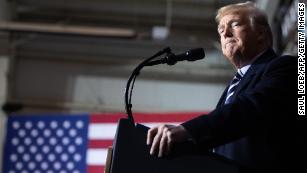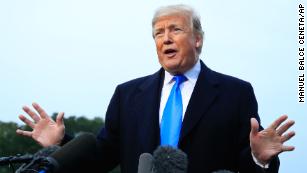Lyndon B. Johnson warned us about this
Julian Zelizer is a professor of history and public affairs at Princeton University and author of "The Fierce Urgency of Now: Lyndon Johnson, Congress and the Battle for the Great Society." The opinions expressed in this commentary are his own. View more opinion at CNN.
(CNN)Fifty-two years ago, President Lyndon Johnson warned the nation not to be seduced by proponents of a white backlash. Less than 48 hours before the 1966 midterms, just like today, LBJ saw in the electorate a noxious mix of white anger, hatred and resentment.
Back then, the white backlash had taken form in response to the riots in the Watts neighborhood of Los Angeles one year earlier as well as to an open housing bill that his administration was trying to push through Congress aimed at eliminating racism in the sale or rental of property.
Speaking to reporters at a televised news conference in Fredericksburg, Texas, on November 6, Johnson read from a prepared statement in which he explained, "I can think of nothing more dangerous, more divisive, or more self-destructive than the effort to prey on what is called 'white backlash.' I thought it was a mistake to pump this issue up in the 1964 campaign, and I do not think it served the purpose of those who did. I think it is dangerous because it threatens to vest power in the hands of second-rate men whose only qualification is their ability to pander to other men's fears. I think it divides this nation at a very critical time -- and therefore it weakens us as a united country."
Though LBJ had been a product of the South and had opposed civil rights legislation earlier in his career, he had come to fully embrace the cause of civil rights with a religious zeal, pushing the Civil Rights Act of 1957 while serving as Senate majority leader and then as President moving the Civil Rights Act of 1964 and the Voting Rights Act of 1965 through the Congress.
The President, who was frustrated that the accomplishments from his Great Society were at risk in 1966, didn't hold back when speaking to the reporters. "I think that the so-called 'white backlash' is destructive, not only of the interests of Negro Americans, but of all those who stand to gain from humane and farsighted government. And those that stand to gain from humane and farsighted government is everybody. Nevertheless, there are those who try to stimulate suspicion into hatred, and to make fear and frustration their springboard into public office. Many of them do it openly. Some let their henchmen do it for them. Their responsibility is the same."
Johnson warned that, "Racism -- whether it comes packaged in the Nazi's brown shirt or a three-button suit -- destroys the moral fiber of a nation. It poisons public life. So I would urge every American to ask himself before he goes to the polls on Tuesday: Do I want to cast my vote on the basis of fear? Do I want to follow the merchants of bigotry?"
LBJ had his eye on the backlash that was taking place in many parts of the country, with special concern for Georgia, where Democrat Lester Maddox was running against Republican Bo Callaway for governor with naked appeals to angry whites. Maddox, who had received the support of the KKK, was famous for having waved a pistol at three African-American Georgia Tech students who he chased away from his whites-only restaurant, the Pickrick Restaurant, after passage of the Civil Rights Act of 1964.
Unfortunately, too many parts of the nation didn't listen to LBJ's warning, and we are still paying the price. The midterms -- which drew a record-high midterm turnout of 49% -- didn't go well for the administration. Although Democrats still controlled the House and Senate, Republicans had gained 47 seats in the House and three seats in the Senate. The GOP did well in Democratic bastions like Chicago, where some white, ethnic, working-class voters responded to the demagogues who warned that their property was at risk.
The conservative coalition of Southern Democrats and Republicans who had blocked progress on liberal legislation since 1938, who suffered a major setback in LBJ's landslide victory in 1964, were back in full force. Conservatives also did well in state races, including Maddox who won in Georgia -- the state that today is once again ground zero for efforts to roll back the gains of civil rights through voting restrictions.
Even worse, the politics of white backlash did not disappear from the conservative landscape. The partisan appeals continued to white, protestant men, whose fear that the country was changing around them never went away. President Richard Nixon, who returned to the national landscape by campaigning on law and order for Republicans in the 1966 midterms, exploited these fears with his promises for "law and order" and a Southern Strategy that aimed to pick up formerly Democratic votes in Dixie by resisting civil rights.
During the 1980s, Republican campaign consultant Lee Atwater was a master at using this ploy, most famously with an ad in 1988 about a parole program in Massachusetts -- the home state of Democratic governor Michael Dukakis -- that allowed an African-American prisoner Willie Horton to go free for a weekend during which he escaped and later raped a woman and stabbed her husband. White backlash has continued to flare, such as with the birther campaign in 2011, where Republicans like Donald Trump questioned the legitimacy of the first African American president.
For more opinion...
While the politics of white backlash have been a part of conservative politics since the 1960s, most mainstream political leaders refused to make this the centerpiece of the campaign and they pushed back against these elements of the electorate once the most heated parts of the campaign were done. They tried to build broad coalitions that revolved around issues like anti-communism and tax reductions rather than pure, undiluted hate.
Not this time. President Trump has made white backlash a defining character of his presidency.
This weekend, former President Barack Obama offered a similar warning as LBJ, arguing that the midterms were a test of the character of the nation. On Tuesday, Americans have a chance to send a strong statement, through hundreds of congressional races, that the toxic brand of backlash politics President Trump and many Republicans have peddled in the last month is not acceptable in 2018.
end quote from:
https://www.cnn.com/2018/11/05/opinions/lyndon-b-johnson-warned-us-about-this-backlash-opinion-zelizer/index.html



















No comments:
Post a Comment